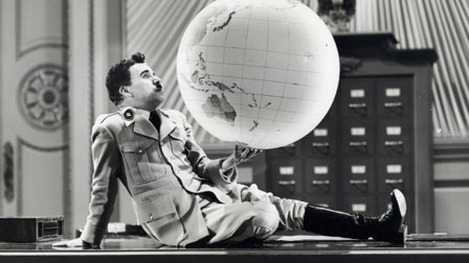C+ | In the 1940's, a buffoonish dictator and a harmless Jewish barber look eerily alike. Directed by Charlie Chaplin Starring Charlie Chaplin and Jack Oakie Initial Review by Joe Setnor |

For starters, Chaplin made a bold decision to apply his slapstick style he honed in years of silent film making, to the characters in The Great Dictator. It's a decision that could easily have backfired, since the subject matter was off such a serious nature. But Chaplin pulls it off by crafting scenes that portray real human emotion. In one scene, we see the powerful, but at times painfully awkward Hynkel, gracefully dance with a balloon in the shape of a globe. The scene is a throwback to Chaplin's silent film days, as there is no dialogue occurring, only dancing and music. By the end of the scene, you understand that Hynkel only has love for just his own desires of total world domination. However, it's pretty clear that his desires may very well destroy the thing he loves so much.
The other dramatic scene is the crescendo of the film, and appropriately carried out through the medium of an awe-inspiring speech. Delivered by the Jewish Barber (Chaplin himself is not Jewish), his words are eloquent, appealing, and moving. It’s appropriate to see the film peak this way because of how it contrasts Hitler's style of maniacal rambling at the podium. While both Hitler and the Jewish Barber are impassioned in the moment, we only see humanity in the Barber. Hitler's anger demonstrative appeals prompted fear and aggression, while the Barber inspires those listening to open their eyes and embrace the humanity around them.
The real life impact of the film is impossible to define, but it does set the stage for American political debate for the following two years as America officially remained neutral to the affairs of Europe. Again, this showed the brilliance of Chaplin, as he had understood the severity of the issues going on. But it's impact is also felt in the arts, as Chaplin was able to really exhibit the effectiveness of intelligently driven satire. Satire remains, today, a vital aspect of the arts and entertainment industry. It's perhaps the most useful medium to represent disdain in political figures and decisions. For modern influence, look no further than HBO's widely successful Veep, or to The Onion, which is now valued at more than the Washington Post.
Chaplin’s brilliance cannot be overstated in The Great Dictator. The film represents not just a very public “fuck you!” to the Third Reich, but it also lays the foundation for Hollywood to recognize and understand the power that can be found in film.
Grade: A+
 RSS Feed
RSS Feed